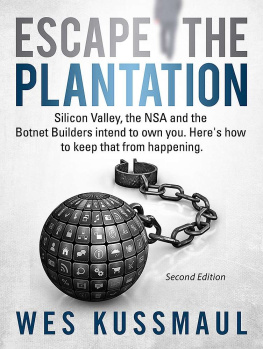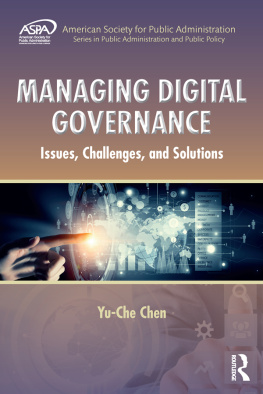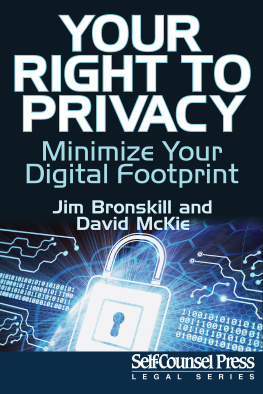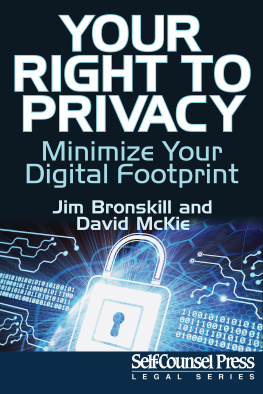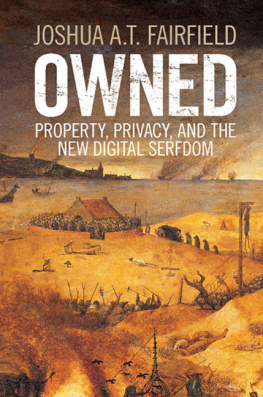Wes Kussmaul - Escape the Plantation
Here you can read online Wes Kussmaul - Escape the Plantation full text of the book (entire story) in english for free. Download pdf and epub, get meaning, cover and reviews about this ebook. year: 2015, publisher: PKI Press, genre: Romance novel. Description of the work, (preface) as well as reviews are available. Best literature library LitArk.com created for fans of good reading and offers a wide selection of genres:
Romance novel
Science fiction
Adventure
Detective
Science
History
Home and family
Prose
Art
Politics
Computer
Non-fiction
Religion
Business
Children
Humor
Choose a favorite category and find really read worthwhile books. Enjoy immersion in the world of imagination, feel the emotions of the characters or learn something new for yourself, make an fascinating discovery.
- Book:Escape the Plantation
- Author:
- Publisher:PKI Press
- Genre:
- Year:2015
- Rating:4 / 5
- Favourites:Add to favourites
- Your mark:
- 80
- 1
- 2
- 3
- 4
- 5
Escape the Plantation: summary, description and annotation
We offer to read an annotation, description, summary or preface (depends on what the author of the book "Escape the Plantation" wrote himself). If you haven't found the necessary information about the book — write in the comments, we will try to find it.
Wes Kussmaul: author's other books
Who wrote Escape the Plantation? Find out the surname, the name of the author of the book and a list of all author's works by series.
Escape the Plantation — read online for free the complete book (whole text) full work
Below is the text of the book, divided by pages. System saving the place of the last page read, allows you to conveniently read the book "Escape the Plantation" online for free, without having to search again every time where you left off. Put a bookmark, and you can go to the page where you finished reading at any time.
Font size:
Interval:
Bookmark:
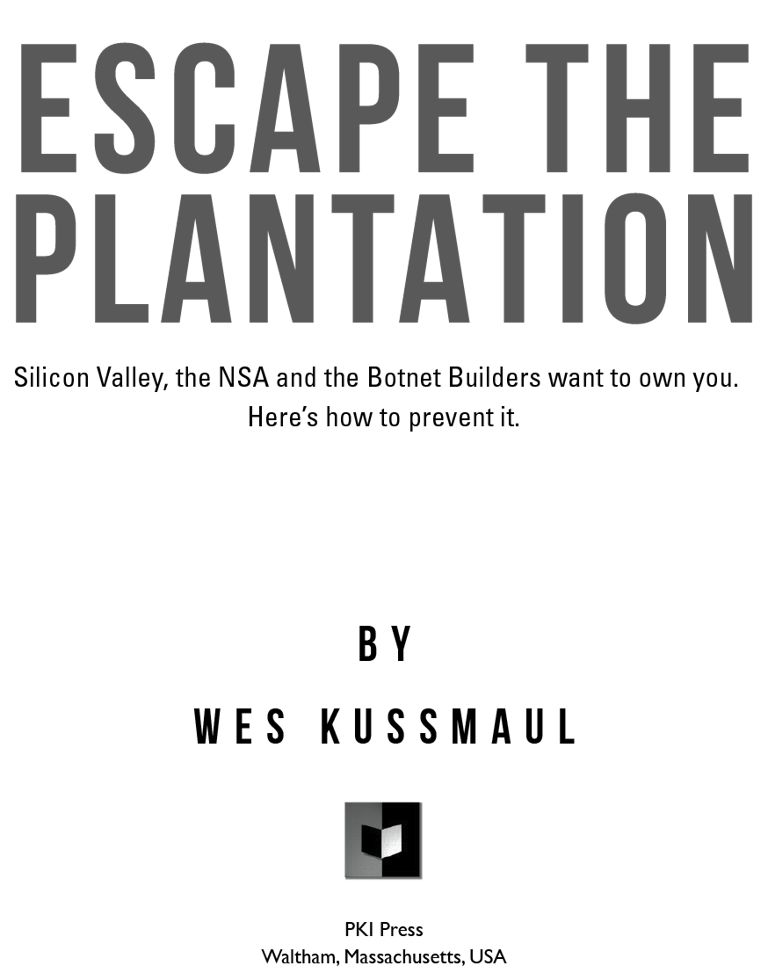
ESCAPE THE PLANTATION
Copyright 2014 by Wes Kussmaul. All rights reserved. No part of this book may be reproduced in any form by any electronic or mechanical means, including photocopying, recording, or by any information storage or retrieval system, without the prior written permission of the copyright owner or the publisher.
Publisher: PKI Press
Published in the United States of America by PKI Press
738 Main Street, Waltham, MA 02451
http://www.pkipress.com
Identity Is the Foundation of Security , Tabelio, InDoors, Quiet Enjoyment , Quiet Enjoyment Infrastructure , PEN and QEI are trademarks of The Authenticity Institute, Inc.; Village is a U.S. registered trademark of Global Villages, Inc. Other trademarks mentioned in this book are the property of their owners. Patents Pending.
Kussmaul, Wes, 1946
Escape The Plantation / Wes Kussmaul.
pages cm
ISBN-13: 978-1-931248-23-5 (alk. paper)
ISBN-10: 1-931248-23-0 (alk. paper)
1. TelecommunicationSecurity measures. 2. InternetSecurity measures.
3. Computer security. 4. False personationPrevention. 5. Privacy. I.
Title.
TK5102.85.K84 2013
005.8dc23
2013000775
Foreword by Dan Geer
The single most important step in engineering is to get the problem statement right. This is as true in social engineering as it is in information systems engineering. Wes Kussmauls book is an attempt to do just that: to get the problem statement right, and to do so where social and information systems engineering meet, which is to say security. He deserves a gold star for even trying.
Such work is not easy. Those who say it is easy are either fools or charlatans. Kussmaul is neither a fool nor a charlatan. He brings to the task the benefit of prolonged study but he has necessarily bitten off a lot; the question for you, the prospective reader, is can you chew what he has bitten off? The answer is a hopeful yes, but it is not trivial the way marshmallow fluff is trivial. This is difficult territory because it is important.
The four verities of governance are:
Most important ideas are not exciting.
Most exciting ideas are not important.
Not every problem has a good solution.
Every solution has side effects.
In no part of modern life is this more true than in the interplay around security. Security is about tradeoffs between simplicity and flexibility, between effectiveness and precision. Forks in the road appear at every turn, between security and privacy, between the public and the private, between the national and the local, and so forth. To get the big picture, as it is generally called, is very, very difficult. Getting the big picture absolutely does not mean backing off far enough that you can make blurry pronouncements as if details didnt mattersecurity is exactly where details matter most. Getting the big picture in security means to have a near-complete view of every detail.
Why every detail? Because for security to work you have to know how it fails. If that doesnt strike you as profound, pause for a moment and re-think your intuition. How security fails drives how security can be applied and how it can advance; for that reason the details matter, and they matter enormously. All the security technologies and strategies that have been developed to date have something to teach us about what not to do next time. If we grasp the failure modes then we can make progress. If we cannot, then we are doomed to reinventing the unworkable.
In that bigger picture we, all of us, are jointly at a considerable crossroad with respect to security. There is no doubt that information society is an apt enough description of the future. Thus the main and nearly philosophical question before us is whether we craft security technology that conforms to the real world intuitions of real people, or whether we expect those real people to conform to the security technology that we actually build. In other words, what is the problem statement?
Kussmaul attempts to answer this. And because he is looking forward there is necessarily some speculation to what he has to say. Perfect predictions of possible futures do not exist and because security is largely about tradeoffs he has to make some. This is a sign of rationality because it is only the fool or the charlatan who says that You can have it all. Instead, Kussmaul starts from What do we want? and from that derives What do we need? He understands that trust is efficient but only if there is recourse to its misuse. He understands the real world intuitions of real people and deftly uses analogies of the physical world to derive what is missing in todays security solutions.
He has even gone so far as to practice what he preaches. He establishes a base pointthat identity must matterand from there critically reviews nearly every one of the security worlds existing answers to the identity question. He is skeptical (what the great thinker Santayana recommended by calling skepticism the chastity of the intellect) but, as every businessman has learned, there is no point in complaining if you dont have an alternative. This book is both that complaint and that alternative. Kussmaul has become an Individual Adherent of the Latin Notariat (read on). He has implemented the technology for his vision if for no other reason than to prove by demonstration that it can be done. His effort, in other words, is the real thing.
It is, of course, true that in the social and technology marketplaces the best product frequently does not win. If best always won there would be no need for advertising, after all. This is perhaps especially true when it comes to technologies that succeed most when they are least visible, and that describes security technology particularly well. In fact, one of the National Science Foundations four grand challenges in digital security is to make being safe no longer require being an expert. If being safe is to not require massive re-education then being safe will have to rely on one of two things: the publics intuitive and thus willing participation in its own security, or the publics outsourcing its safety to someone else to take care of it for thema privatized digital nanny state. To this writer, the latter is anathema.
Thus we come to a recommendation: Read this book. Read it with the skepticism of its writer. If you like it, then proceed accordingly. If you dont, then offer an alternative at least as far reaching and no more costly. You will find that task challengingnot exciting, merely important.
Dan Geer
Cambridge, Massachusetts
Authors Preface
This book is derived from a larger volume entitled Quiet Enjoyment. First published in 2004 and updated with a second edition in 2014, Quiet Enjoyment introduced the Quiet Enjoyment Infrastructure, a proposed comprehensive solution to the problems that are caused by pervasive inauthenticity in the worlds information infrastructure.
This volume retains most of the material that deals with the first of three groups of components - the Authenticity Infrastructure that constitute the Quiet Enjoyment Infrastructure. The other two parts, the InDoors Infrastructure and the Common Vocabulary Infrastructure, were condensed.
Material that appears here and not in Quiet Enjoyment includes detail about threats to privacy. Unlike most other treatments of the subject, we include extensive information about what I believe is as big a threat as invasion of privacy itself: the manipulation of perceptions. Weve also added text to support this books focus on the way QEI solves privacy problems in particular. Just keep in mind as you read it that QEIs purpose is not just to enhance personal privacy. QEI brings authenticity to an online (and offline) world where authenticity is scarce and growing scarcer, and where that lack of authenticity is now causing precisely the problems that were predicted in the first edition of Quiet Enjoyment .
Next pageFont size:
Interval:
Bookmark:
Similar books «Escape the Plantation»
Look at similar books to Escape the Plantation. We have selected literature similar in name and meaning in the hope of providing readers with more options to find new, interesting, not yet read works.
Discussion, reviews of the book Escape the Plantation and just readers' own opinions. Leave your comments, write what you think about the work, its meaning or the main characters. Specify what exactly you liked and what you didn't like, and why you think so.

